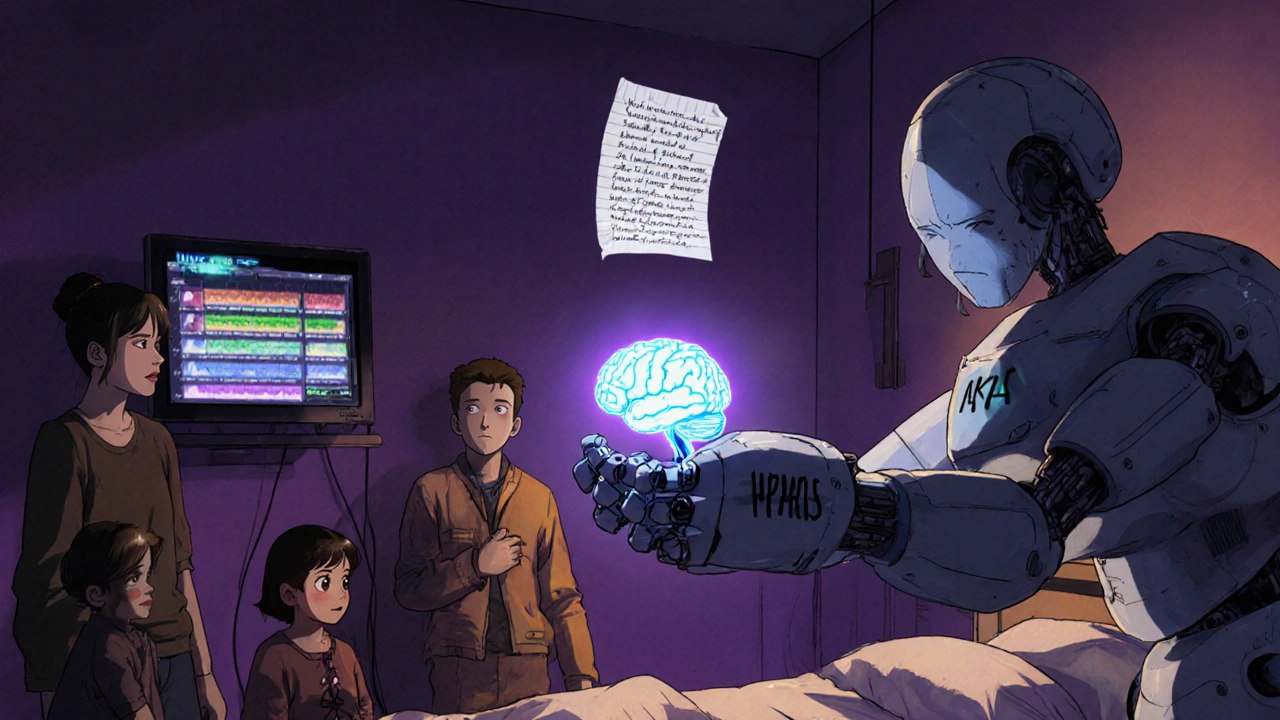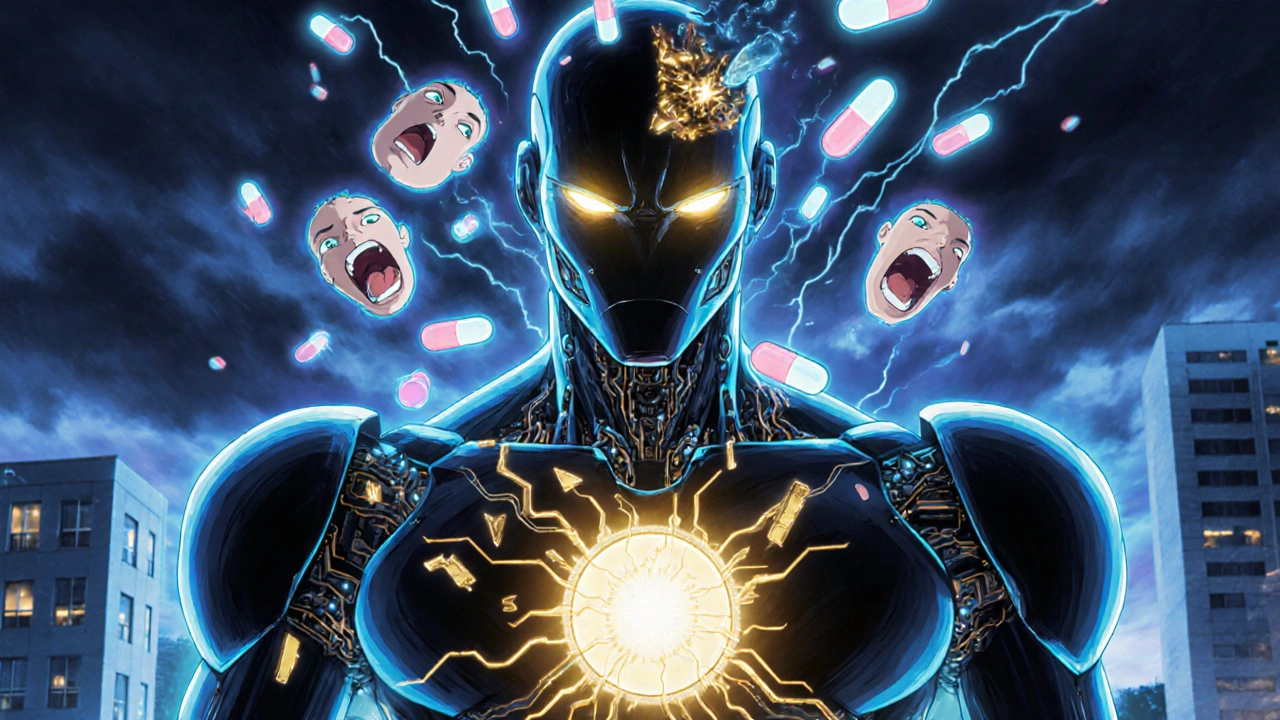Corticosteroid Psychosis Risk Calculator
Calculate your risk of corticosteroid-induced mood changes
This tool helps estimate your individual risk of experiencing mood or behavioral changes from corticosteroids based on key factors. Remember: this is an estimate only and not medical advice.
When you’re prescribed corticosteroids for asthma, rheumatoid arthritis, or a flare-up of an autoimmune condition, you’re probably focused on getting relief from pain, swelling, or breathing trouble. But there’s another side to these powerful drugs-one that doesn’t show up on blood tests or X-rays. Corticosteroids can change how you think, feel, and act-sometimes in dramatic, dangerous ways.
It’s not rare. About 5% to 18% of people taking systemic corticosteroids like prednisone will experience mood or behavioral changes. At higher doses-80 mg or more of prednisone per day-that number jumps to nearly one in five. And in some cases, these changes aren’t just irritability or trouble sleeping. They can be full-blown psychosis: hallucinations, delusions, paranoia, or extreme mania. This isn’t something that happens to "someone else." It happens to people you know-parents, grandparents, neighbors-people who took their meds exactly as directed and woke up feeling like they were losing their mind.
How Soon Do These Changes Happen?
Most people expect side effects like weight gain or upset stomach. But psychiatric symptoms? Those come fast. The median time from starting corticosteroids to the first sign of trouble is just three to four days. Some patients report feeling "off" within 24 hours. Others don’t notice anything until after two weeks. The pattern isn’t predictable, but the window is narrow: the first five days are the most critical. Watch for confusion, agitation, or sudden mood swings. If someone who was calm and clear-headed suddenly becomes suspicious, overly energetic, or withdrawn, it’s not just stress. It could be the medication.
And here’s the thing: these changes don’t always go away when you stop the drug. Case reports show that in some people, symptoms like mania or psychosis linger for weeks-even months-after corticosteroids are discontinued. That means the damage isn’t always temporary. The brain doesn’t always reset on its own.
What Do These Changes Look Like?
It’s not just "feeling down" or "being moody." The spectrum is wide-and often misunderstood.
- Euphoria: 27.5% of cases involve an unusual sense of well-being, even excitement. People feel "on top of the world," sometimes making reckless decisions.
- Insomnia: Nearly half of patients can’t sleep, even when exhausted. This isn’t just trouble falling asleep-it’s a complete disruption of sleep cycles.
- Mood swings: Rapid shifts from laughter to rage, or calm to panic, often without trigger.
- Personality changes: A quiet person becomes aggressive. A responsible person starts lying or stealing.
- Severe depression: 14.6% of cases involve deep hopelessness, suicidal thoughts, or complete emotional shutdown.
- Psychosis: Hearing voices, believing things that aren’t true (delusions), or acting in ways that don’t make sense (disorganized behavior).
Some people get only mania. Others get only psychosis. Some get both. There’s no single pattern. That’s why doctors miss it. They look for depression, but the patient is manic. They assume anxiety, but the person is hallucinating.
Who’s Most at Risk?
It’s not just about the dose. Certain people are far more vulnerable.
- Women: Multiple studies show women are more likely to develop psychiatric side effects than men, even at the same dose.
- Older adults (65+): Their brains are more sensitive to hormonal shifts. Corticosteroids can worsen memory loss and confusion, sometimes mistaken for dementia.
- People with a history of mental illness: Especially bipolar disorder. Taking steroids can trigger a manic or psychotic episode in someone who’s been stable for years.
- Those on high doses: Anything above 40 mg of prednisone per day is a red flag. Doses of 80 mg or more carry nearly a 20% risk.
And here’s what many don’t realize: you don’t have to be on steroids for months. A short course-five or seven days-can be enough to trigger symptoms in a vulnerable person.

Why Does This Happen?
No one knows for sure. But science has some strong clues.
Corticosteroids flood the body with synthetic versions of cortisol, your natural stress hormone. That throws off your entire nervous system. One theory points to the hippocampus-the part of the brain that handles memory and emotion. High cortisol levels shrink this area in animal studies, and human brain scans show similar changes. That could explain the memory problems and emotional outbursts.
Another theory focuses on dopamine. Corticosteroids increase the activity of tyrosine hydroxylase, an enzyme that boosts dopamine production. Too much dopamine? That’s the same chemical imbalance seen in schizophrenia. It’s why antipsychotics-drugs that block dopamine-often help.
There’s also the HPA axis-the brain-body system that regulates stress. Corticosteroids suppress it. When that happens, your body doesn’t know how to respond to normal stress anymore. That might explain why some patients feel overwhelmed by tiny things-like a phone call or a traffic jam.
It’s not one thing. It’s a storm of biological changes happening at once.
What Should You Do If This Happens?
If you or someone you care about starts acting strangely while on corticosteroids, don’t wait. Don’t assume it’s "just stress."
The first step is always dose reduction. If the dose is over 40 mg of prednisone per day, tapering down-even slowly-can lead to full recovery in 92% of cases, according to clinical guidelines. But you can’t just stop cold. That can cause adrenal crisis. Work with your doctor.
If tapering isn’t possible-because the underlying disease is too severe-medication may be needed. There are no FDA-approved drugs for steroid-induced psychosis. But doctors use off-label antipsychotics with success:
- Haloperidol: 0.5 to 1 mg per day
- Olanzapine: 2.5 to 20 mg per day
- Risperidone: 1 to 4 mg per day
Symptoms often improve within days. But these drugs have side effects too-drowsiness, tremors, weight gain. They’re not perfect. Lithium has been used to prevent mania, but it’s risky for older adults and requires blood monitoring.
And here’s the hard truth: many doctors don’t know to look for this. A 2016 review in US Pharmacist found that these side effects are underreported and often misdiagnosed as dementia, depression, or substance abuse. That’s why you need to speak up. If you’re on steroids and feel "not yourself," say it. Write it down. Bring it to your next appointment.

What Can You Do to Prevent This?
Prevention starts with awareness.
- Ask your doctor: "What’s the lowest effective dose?" Don’t accept "standard" doses if you’re older or have a history of anxiety or depression.
- Ask: "Is there an alternative?" Sometimes inhaled steroids, physical therapy, or other anti-inflammatories can replace oral ones.
- Set up a check-in plan. If you’re on more than 40 mg of prednisone, schedule a phone call with your doctor after day 3 and again after day 7. Ask: "How am I doing mentally?"
- Involve a family member. Tell someone close to you: "If I start acting weird, tell my doctor."
- Keep a journal. Note sleep, mood, energy, and thoughts. Small changes matter.
Pharmacists are your allies too. If you fill a steroid prescription, ask: "What behavioral side effects should I watch for?" Most don’t volunteer this info. But they’re trained to know.
The Bigger Problem
Doctors write about 10 million new corticosteroid prescriptions every year in the U.S. alone. Globally, it’s far more. These drugs save lives. But they’re treated like harmless pills-like ibuprofen. They’re not.
There’s no standardized screening tool. No blood test. No checklist doctors routinely use. That’s why so many cases slip through. The system isn’t broken-it’s just blind.
Research is lagging too. We still don’t know why some people are more vulnerable. We don’t have biomarkers. We don’t have clinical trials testing specific treatments. The FDA hasn’t approved a single drug for this. That’s unacceptable for a side effect that affects up to 18% of users.
Until that changes, the burden falls on you-the patient, the caregiver, the family member. Know the signs. Speak up. Push for lower doses. Don’t let silence cost someone their mind.
Can corticosteroids cause psychosis even at low doses?
Yes, but it’s rare. Psychosis is most common at doses above 80 mg of prednisone per day, where risk jumps to nearly 18%. At doses below 40 mg, the risk is about 1.3%. However, people with a history of bipolar disorder, older adults, and women can develop psychosis even at lower doses. It’s not about the dose alone-it’s about individual vulnerability.
How long do steroid-induced psychiatric symptoms last?
In most cases, symptoms improve within days to weeks after lowering the dose or stopping the medication. But in some people-especially those with pre-existing mental health conditions-symptoms like mania or psychosis can persist for weeks or even months after discontinuation. This means recovery isn’t always quick, and ongoing monitoring may be needed.
Are there any tests to diagnose steroid-induced psychosis?
No. There’s no blood test, brain scan, or lab result that confirms it. Diagnosis is based on timing and exclusion. Doctors must rule out other causes-like infections, metabolic imbalances, drug interactions, or primary psychiatric disorders. If psychotic symptoms started shortly after beginning corticosteroids and no other cause is found, it’s likely steroid-induced.
Can I stop my steroids if I feel mentally unwell?
Never stop abruptly. Sudden withdrawal can cause adrenal crisis-a life-threatening drop in blood pressure and energy. Instead, contact your doctor immediately. They may advise reducing the dose gradually while monitoring your mental state. In severe cases, they may add antipsychotic medication while tapering.
Do all corticosteroids carry the same risk?
Most oral and injected corticosteroids-like prednisone, methylprednisolone, and dexamethasone-carry similar risks. Inhaled or topical steroids rarely cause psychiatric effects because they don’t enter the bloodstream in significant amounts. The risk is tied to systemic exposure, not the brand name.
Is this side effect listed on the medication label?
Yes, but often buried in fine print. Labels mention "mood changes," "insomnia," and "rarely psychosis," but rarely emphasize how common or severe these effects can be. Most patients don’t read the full prescribing information. That’s why awareness among patients and doctors needs to improve.


Anjan Patel
November 15, 2025 AT 09:01This is why I stopped trusting doctors after my aunt went full-on paranoid on prednisone-thought her neighbor was poisoning her coffee. She was on 60mg for three days. Three. Days. And the doctor just shrugged like it was a side effect of breathing. No one warned her. No one warned ANYONE. This isn't medical advice-it's a goddamn public health failure.
Scarlett Walker
November 16, 2025 AT 01:14Thank you for writing this. I’ve been terrified to tell my doctor I felt like I was losing it on my 5-day steroid burst last month. I laughed uncontrollably at funerals, then cried over spilled milk. I thought I was going crazy. Turns out, it was the meds. I’m not broken. The system is. 💙
Hrudananda Rath
November 16, 2025 AT 01:43It is both lamentable and intellectually indefensible that a pharmaceutical intervention with such profound neuropsychological ramifications continues to be administered with the casualness of a vitamin supplement. The paucity of clinical vigilance, the absence of mandatory psychiatric screening protocols, and the systemic dismissal of patient-reported phenomenology constitute nothing short of a scandal in contemporary medical ethics.
Brian Bell
November 17, 2025 AT 19:39My mom went from chill to ‘I’m the queen of England and the FBI is after me’ in 48 hours on prednisone. We called the doc, they said ‘oh yeah, that’s a thing.’ No big deal. 😅 I’m just glad we caught it before she tried to ‘arrest’ the mailman.
Nathan Hsu
November 19, 2025 AT 10:19Let me be perfectly clear: corticosteroids are not benign. They are not ‘just pills.’ They are potent, neuroactive, hormone-disrupting agents that alter the very architecture of emotional regulation-and yet, they are prescribed with the same indifference as aspirin. In India, we see this daily: grandmothers on 80mg doses, with no one asking about their sleep, their thoughts, their nightmares. This is not healthcare. This is negligence dressed in white coats.
Ashley Durance
November 20, 2025 AT 03:27Of course this happens. People don’t read the label. They don’t research. They don’t track their moods. If you’re on steroids and you don’t journal your emotional state, you’re not a patient-you’re a liability. And yes, women are more vulnerable. It’s biology. Stop acting surprised.
Scott Saleska
November 21, 2025 AT 13:43I just want to say-my dad was on 40mg for gout and started accusing my mom of stealing his pills. We didn’t know it was the meds until he started talking to the TV. He’s fine now, but I wish someone had told us this could happen. I’m not mad, just… really sad that this isn’t common knowledge. Can we please make a pamphlet?
Ryan Anderson
November 22, 2025 AT 20:42This needs to be in every prescription bottle. Not just a footnote. Not buried in 12-point font. A bold, red, 14-point warning: "This drug can make you lose your mind. Watch for hallucinations, mania, or sudden personality shifts. Tell your doctor immediately." 🚨
Eleanora Keene
November 24, 2025 AT 02:38You’re not alone. I was on a 7-day course for a bad flare and felt like I was trapped in a horror movie. I kept thinking my cat was whispering to me. I didn’t tell anyone because I thought I was ‘being dramatic.’ But you’re right-this isn’t drama. It’s biology. Please, if you’re on steroids, talk to someone. Even if it’s just a Reddit post. You’re not crazy. The medicine is.